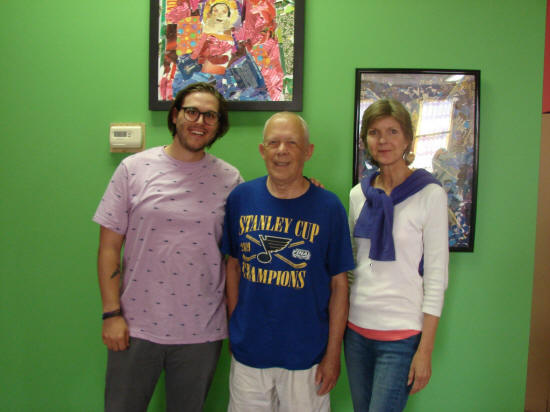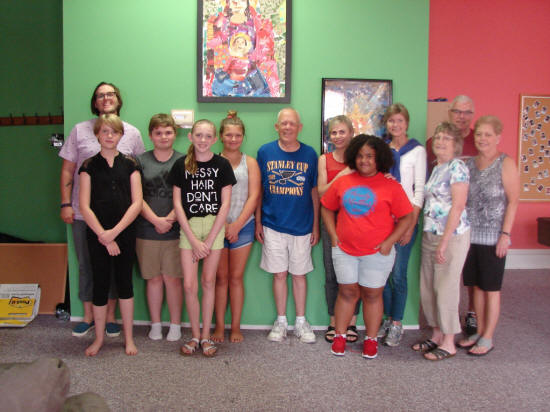|
Pastor challenges local teens
recalling Dr. Martin Luther King times and experience
 Send a link to a friend
Send a link to a friend
 [July 18, 2019] [July 18, 2019]
Imagine growing up in a small quiet Illinois town and then taking
part in one of the most momentous events in the history of the
United States. That is exactly the story that Lincoln resident
Carroll Richards told at the Wednesday meeting of ‘The Center for
Creativity and Community’ held at the First Presbyterian Church.
Laura Elliott, director of the Center, arranged for Pastor Richards
to tell the arc of his life that took him from Mattoon, Illinois to
Memphis, Tennessee at the time of the assassination of Martin Luther
King.
In addition to the junior high students who participate in the
Center, and were not yet born during those tumultuous times, the
event drew adults who remembered it well, lived through it.
“Growing up in Mattoon, I really had no idea about what it was like
for an African American to live in the south before the Civil Rights
Movement,” Richards said. All of that changed on a family vacation
to the south. “I wanted a drink of water and went to the fountain
that did not have a line at it. My father ran over and pulled me
aside and pointed to the sign that said “Colored” above the
fountain,” he said. That was his introduction to a system of racial
segregation that existed in the south.
After college at Eastern Illinois and a year of teaching math,
Richards felt the presence of God in his life and decided to become
a pastor. His parents valued religion and hosted missionaries in
their home from all over the world when they visited Mattoon. He
enrolled in seminary in Memphis and began his education to become a
religious leader.
“Our seminary had blacks and whites studying together, and I made
friends with several African Americans. I learned from them about
the protests and marches that were occurring to protest their
terrible treatment at public facilities throughout the south,”
Richards said. Asking what he could do, he was told to help with the
protests in Memphis, to march shoulder-to-shoulder with them.
In early 1968, events that would change the United States forever
were taking place all over the country including Civil Rights
protests and opposition to the Viet Nam war. Memphis was at the
epicenter of the Civil Rights Movement in March of 1968 with a
strike by the trash collectors who were all African American.
“Sanitation workers were treated with contempt by their white
supervisors, poorly paid, and worked in dangerous conditions,” said
Richards. After two collectors were killed, enough was enough. A
strike ensued against the city by the sanitation workers.

Dr. Martin Luther King was called upon to come to Memphis to bolster
the demands of the workers, to lend national credibility to the
strike.
On March 3, 1968 a large protest march was formed that was to travel
from a church to Memphis City Hall. “I joined in the march near the
front, which was led by Dr. King. I got to see him as we walked and
protested toward city hall,” Richards said.
[to top of second column] |

Pastor Adam Quine of First
Presbyterian Church, Carroll Richards, and The Center for Creativity and
Community Director Laura Elliott.

All went well until some elements began breaking store windows and
looting. “Dr. King advocated nonviolence, but some members stepped
over the line with their fighting. Afterward, the trash collectors
said that this violent behavior ruined the march,” he said.
“I saw the police in their riot gear with guns and bayonets and knew
that staying around would be very dangerous. My friend from school
and I left the parade. Years later I became reacquainted with my
African American friend who was with me that day and asked what he
thought. He said he was sure he was going to die. It was bad,”
Richards added.

Because of the failure of the initial march, Dr. King was asked to
come back to Memphis to lead a second protest march. “I intended to
march in that one also. I wanted to meet Dr. King, but as I was
preparing to head out, news came of his assassination,” said
Richards.

Pastor Carroll
Richards (in Stanley Cup shirt) enthralled this group of kids and
adults with his remembrance of his time with the Civil Rights
movement in the 1960’s. He marched with Dr. Martin Luther King in
Memphis.
Pastor Richards was asked what he learned from his experience
protesting the bigotry that was rampant during his time in Memphis.
“Even though I was only one of a few white protesters among the sea
of African Americans who participated in the marches, I learned that
you can’t sit on the sidelines when an injustice happens. You must
speak out. You can make a difference,” he told his audience at The
Center for Creativity and Community.
Carroll Richards has dedicated his life to helping others through
pastoral care and counseling. His journey has taken him from the
chaos of the 1960’s to a quiet afternoon at First Presbyterian
Church telling the young teens at the Center for Creativity and
Community to support what is right, to take a stand against
injustice.
[Curtis Fox] |